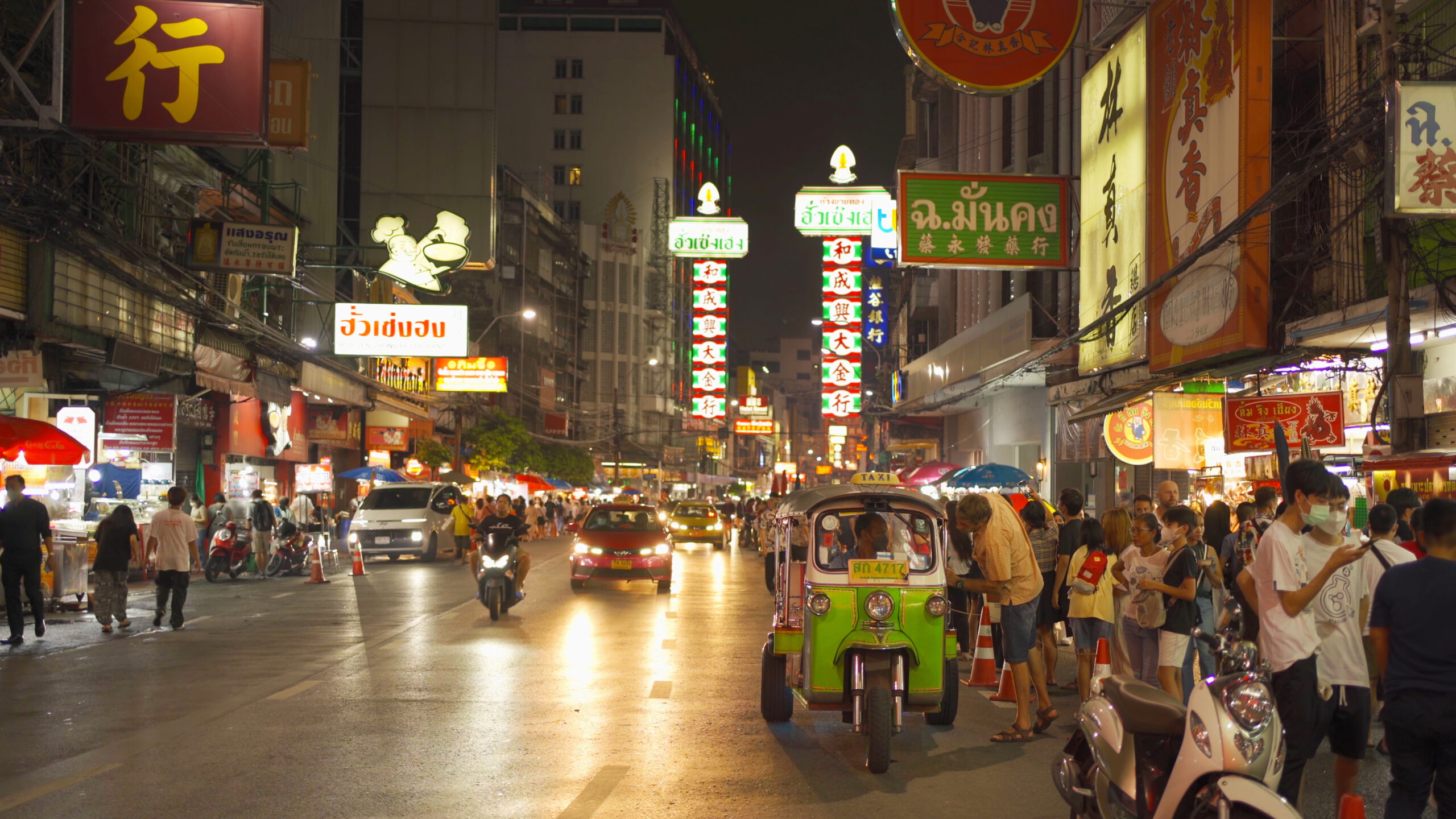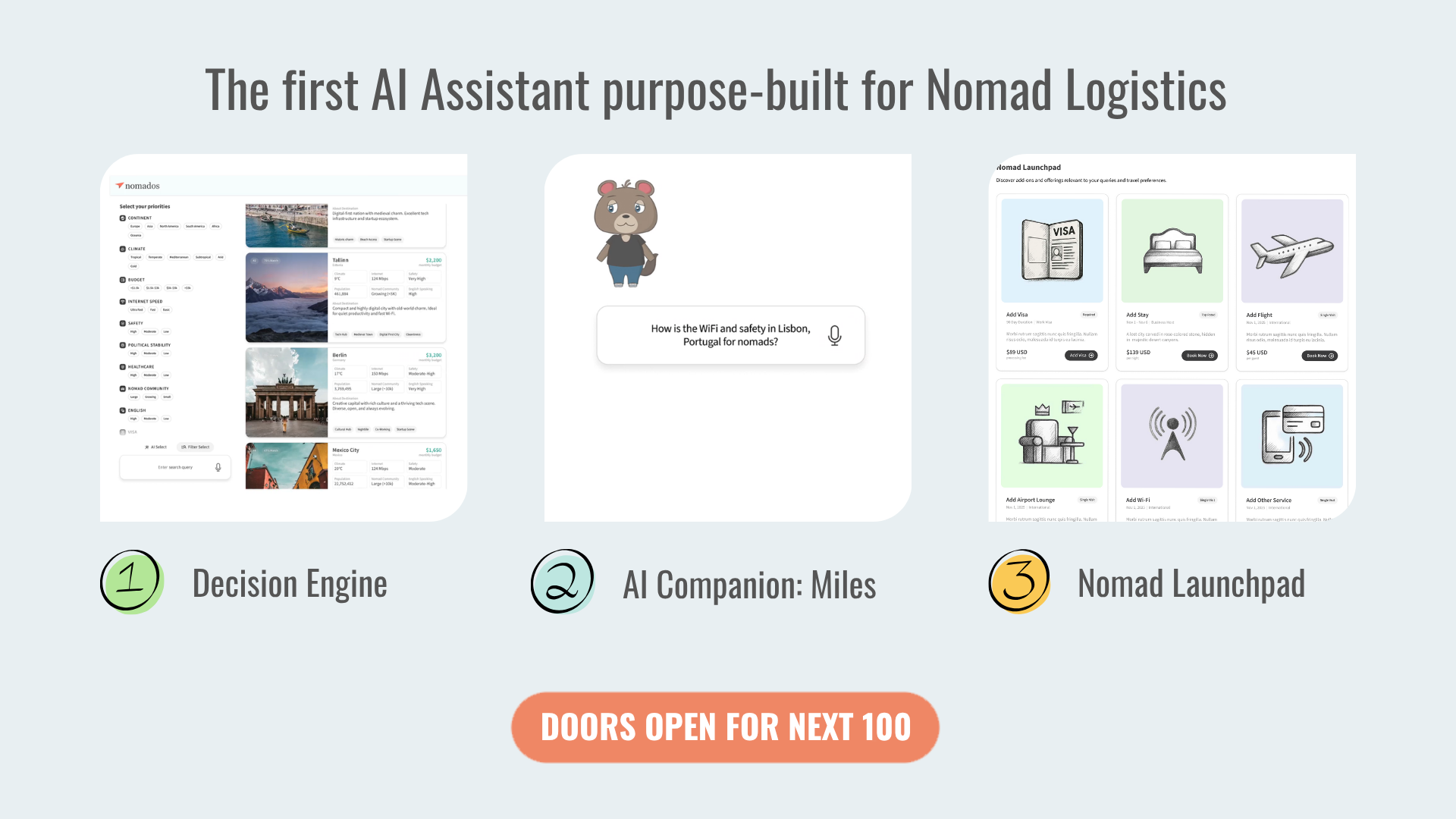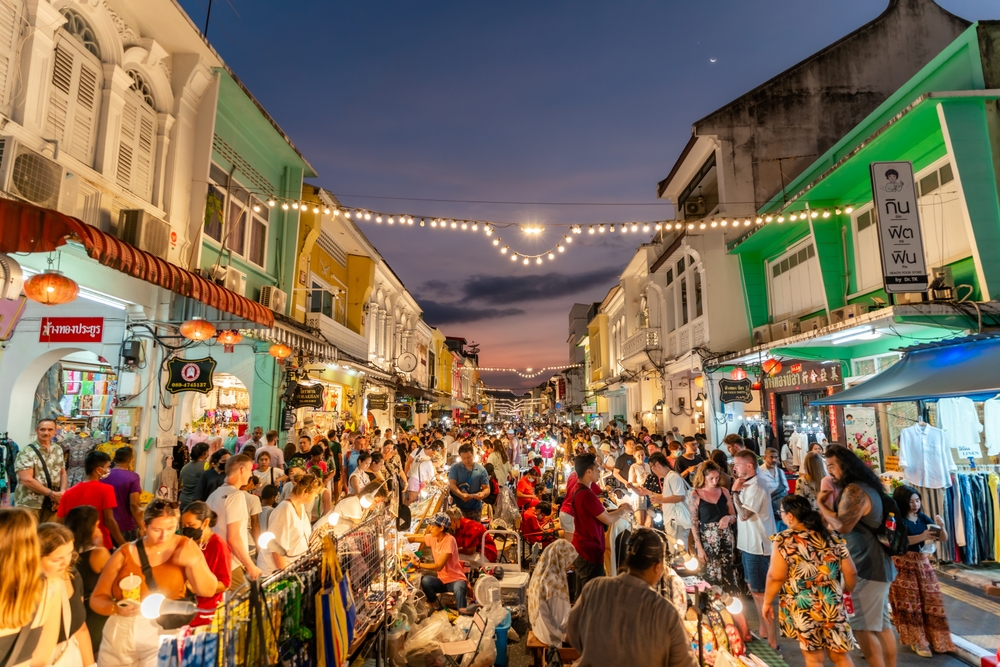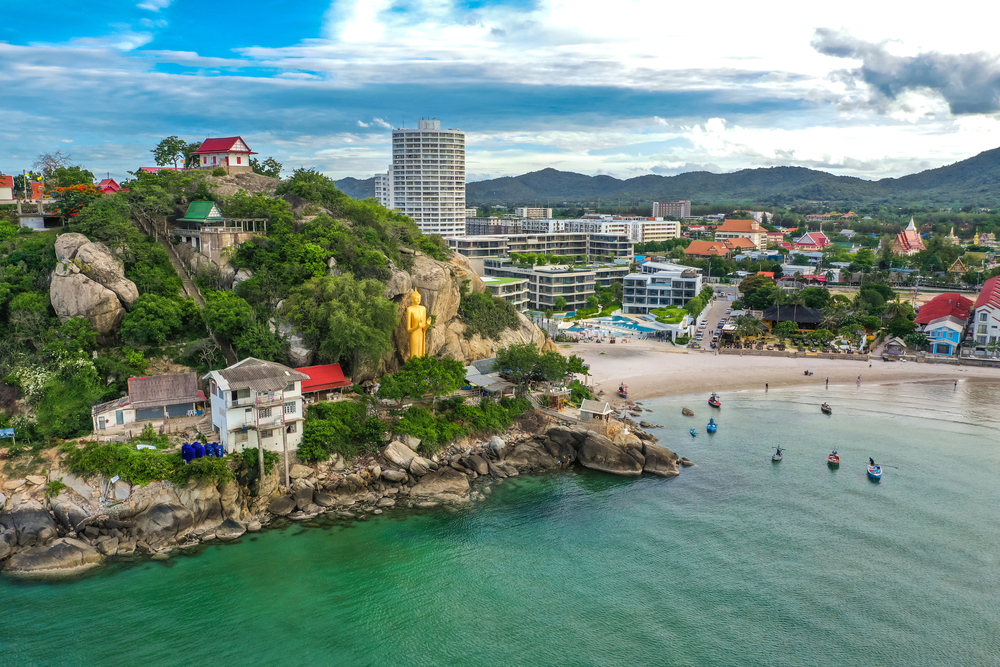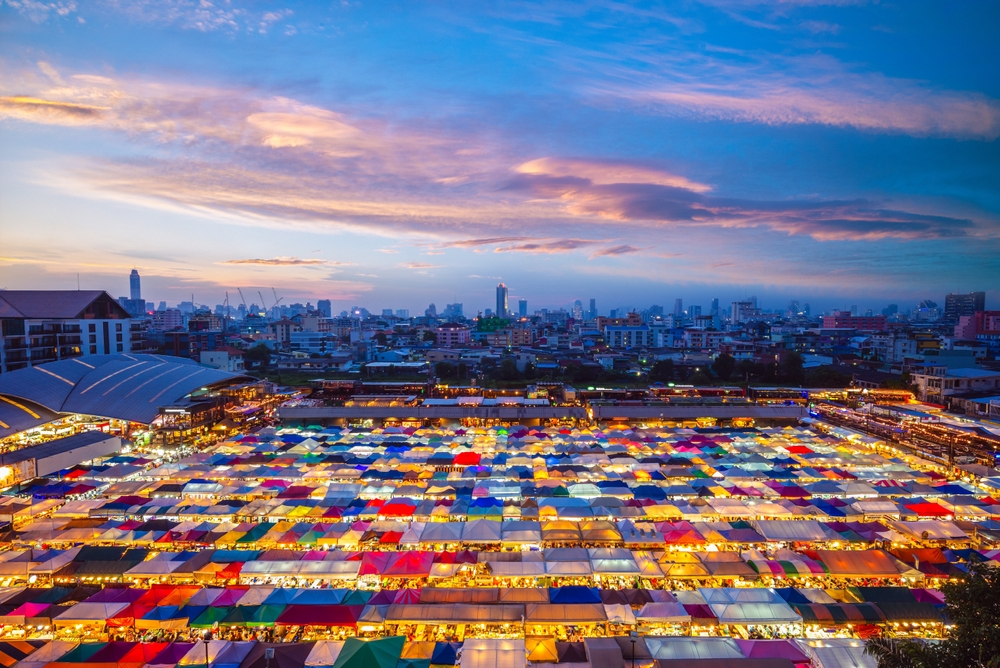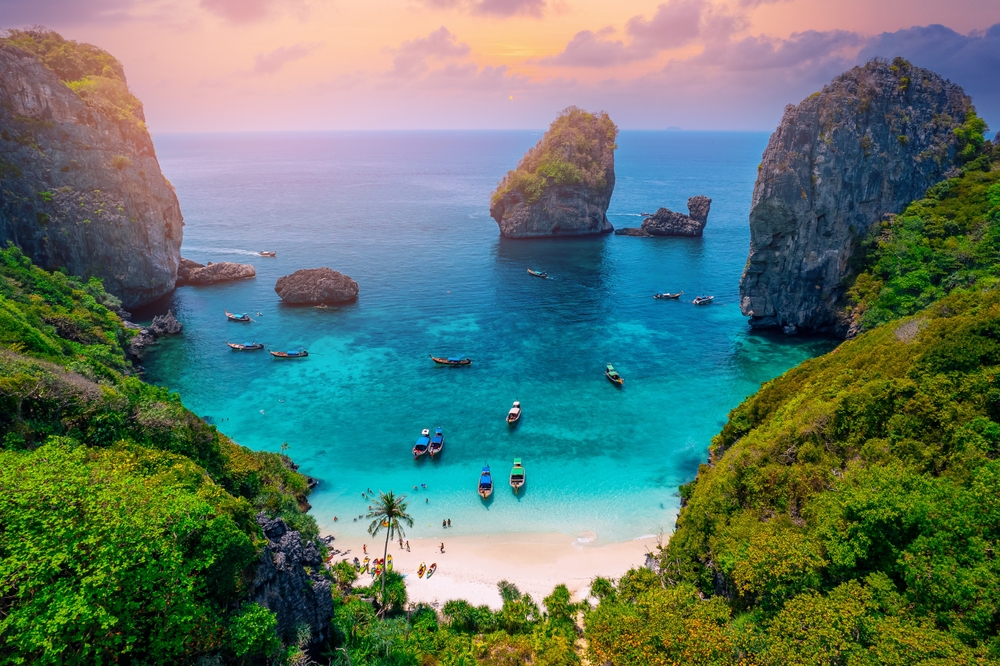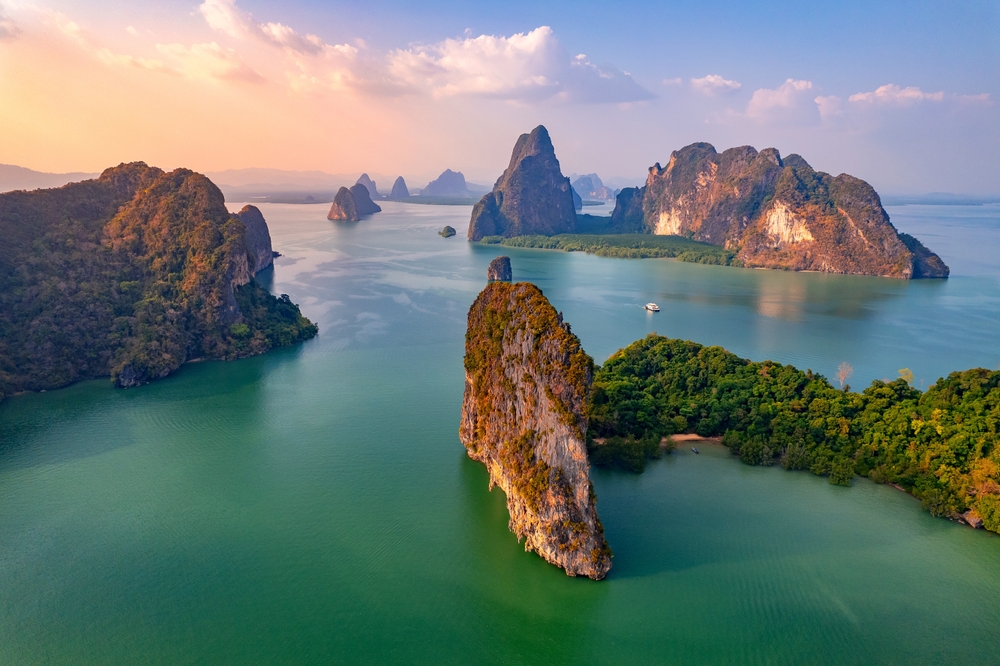Why Is Thailand One of the Best Countries for Digital Nomads in 2025?
Thailand has established itself as one of Asia’s premier destinations for remote workers and digital nomads. It offers an exceptional balance of affordability, tropical beauty, rich culture, and reliable infrastructure. From the high-energy streets of Bangkok to the mountain calm of Chiang Mai and the island rhythms of Koh Phangan, Thailand provides diverse environments for those seeking both productivity and adventure.
Quick Answer: Thailand offers multiple visa pathways for digital nomads, including the new Destination Thailand Visa (DTV)—a five-year option requiring a 500,000 THB (~USD 15,000) balance—along with tourist and education visas. Monthly living costs typically range from USD 800–1,200, supported by excellent internet, modern coworking spaces, and a large international community. The country blends a relaxed tropical lifestyle with modern amenities and a deeply rooted Buddhist culture.
Thailand’s Visa Options for Digital Nomads (Updated Late 2025)
Thailand continues to attract remote professionals, freelancers, and entrepreneurs, but there’s still no single “Digital Nomad Visa” in name. Instead, several flexible visa pathways now support long-stay remote work lifestyles.
The door are now open for the next 100 people! Polished mobile version, triple the destinations, cross-border insurance and more. Join the next 100 people FREE.
Destination Thailand Visa (DTV) — Officially Live in 2025
Thailand’s most ambitious long-stay visa for remote workers is now fully launched. It gives digital nomads a clear, legal route to base themselves in the kingdom long term.
Key Details:
-
Validity: 5 years (multiple entry)
-
Stay per entry: Up to 180 days, extendable for another 180 days
-
Financial requirement: Minimum THB 500,000 (≈ USD 14,000) in a Thai or foreign bank account
-
Eligible applicants: Remote employees, freelancers, and entrepreneurs working for foreign-registered companies or clients
-
Application fee: ≈ THB 10,000 (USD 280)
-
Processing time: ≈ 15 working days
-
Family: Spouse + children under 20 may apply as dependents
-
Work authorization: Remote work for overseas clients and companies explicitly permitted
-
Additional activities allowed: Wellness travel, medical treatment, cultural courses, sports training
As of Q4 2025: The Thai government reports over 35,000 applications since launch, highlighting strong international interest in this program.
Tourist Visas and Visa Exemptions
Short-term digital nomads still rely on Thailand’s generous tourist entry options.
-
Visa Exemption: 30 days (+ 30-day extension), free entry for citizens of 64 countries including the US, UK, EU, and Australia. Technically prohibits work but remote work is largely tolerated.
-
Tourist Visa (TR): 60 days (+ 30-day extension); apply at Thai embassy or consulate. Requires proof of funds and onward travel. Typical fee USD 40–80.
Education Visa (ED)
Still popular for longer stays via language or cultural courses, though authorities now scrutinize attendance more strictly.
-
Duration: 1 year (renewable)
-
Requirement: Enrollment in approved Thai language school or cultural program with verified attendance records
-
Cost: USD 200–400 plus course fees
Thailand Elite Visa Program
For high-net-worth individuals seeking VIP treatment and long-term security.
-
Elite Easy Access: 5 years for ≈ USD 17,000
-
Elite Family Excursion: 5 years family package ≈ USD 25,000
-
Elite Superiority Extension / Privilege: 10–20 years from USD 30,000–65,000
Benefits include VIP airport services, concierge support, and streamlined immigration processing.
Regional Comparison (2025 Snapshot)
| Country | Best Option | Duration | Investment / Income Requirement | Key Advantage |
|---|---|---|---|---|
| Thailand | DTV | 5 years | THB 500,000 bank balance | Long stay + remote work permission |
| Malaysia | MM2H | 10 years | ~ USD 120,000 deposit | Longest duration in region |
| Philippines | SRRV | Permanent | USD 10–50 k | Path to residency |
| Vietnam | E-Visa | 90 days | None | Low cost entry |
| Indonesia | B211A / KITAS | 180 days–1 year | None | Island lifestyle + low cost |
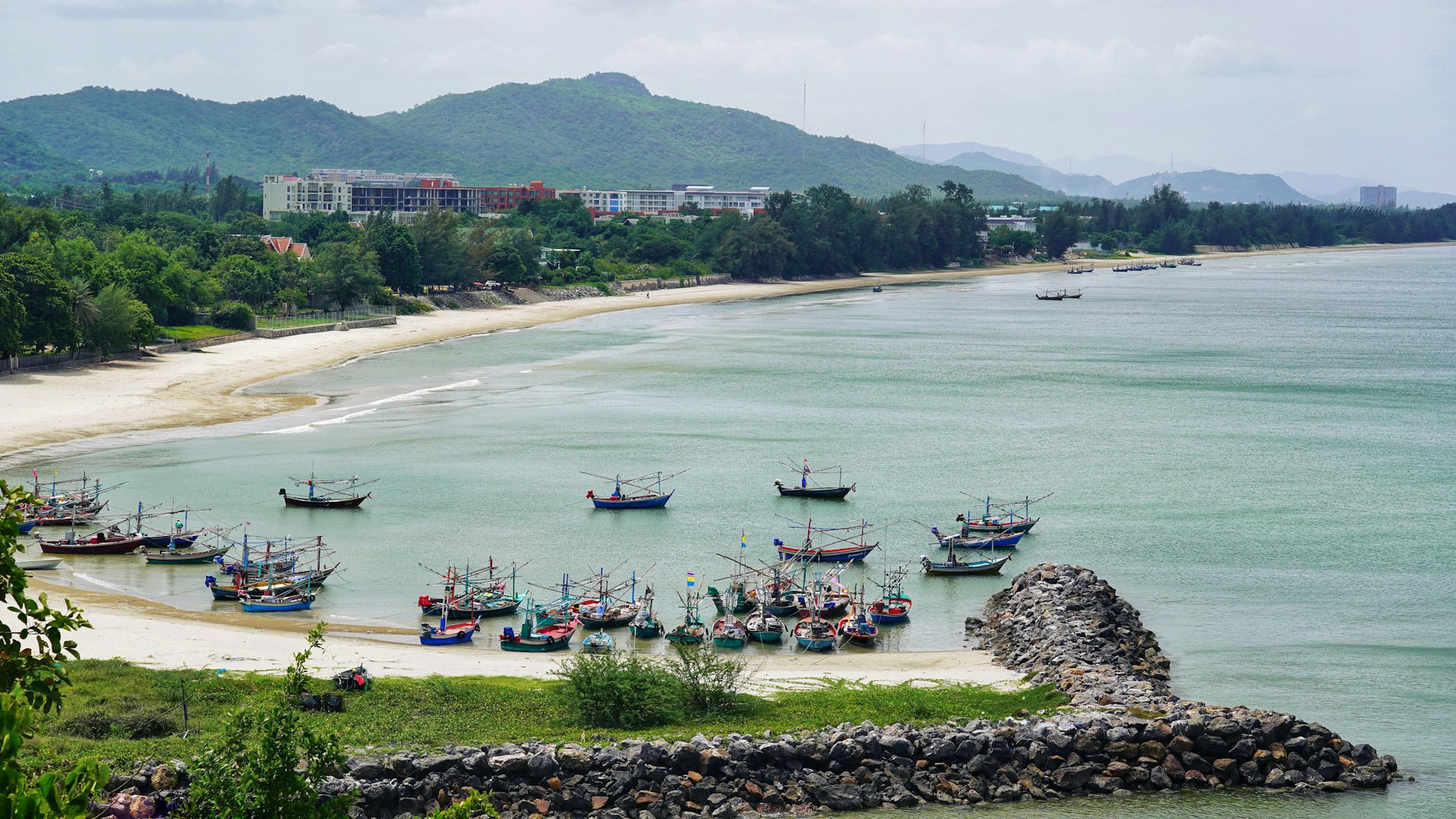
Why Choose Thailand for Remote Work
Thailand offers unique advantages that have made it the epicenter of Southeast Asian digital nomadism for over a decade.
Lifestyle and Cultural Advantages
- Tropical climate with beaches, islands, and mountains
- Rich Buddhist culture emphasizing mindfulness and balance
- World-renowned cuisine with incredible variety and affordability
- Massage culture and wellness opportunities (traditional Thai massage)
- Vibrant expat communities in multiple cities
- English widely spoken in tourist and business areas
Economic Benefits
- Exceptional value for money across all lifestyle categories
- Strong Thai Baht provides stability
- Low cost of living allows for higher savings rates
- Affordable domestic travel for exploring the country
- No foreign exchange restrictions
Infrastructure and Connectivity
- Excellent internet infrastructure in urban areas
- Well-developed tourism infrastructure
- Efficient domestic transportation (planes, trains, buses)
- Modern healthcare system with medical tourism industry
- International airports in Bangkok, Chiang Mai, Phuket, and other cities
Geographic and Strategic Advantages
- Central location for exploring Southeast Asia
- Short flights to major Asian cities
- Diverse geography from beaches to mountains to cities
- Year-round warm climate (though with distinct seasons)
- Easy visa runs to neighboring countries
Top Cities and Destinations
Bangkok: The Urban Powerhouse
Why Choose Bangkok for Remote Work?
Thailand’s capital offers the country’s most sophisticated infrastructure while maintaining authentic Thai character and energy.
Digital Infrastructure in Bangkok
- Excellent fiber internet coverage (100-1000 Mbps widely available)
- Massive coworking ecosystem including Hubba-TO, TCDC, and WeWork
- Day passes: $8-20
- Monthly memberships: $100-300
- Countless cafes with reliable WiFi and AC
Living Costs in Bangkok
- Budget lifestyle: $800-1,200/month
- Comfortable lifestyle: $1,400-2,200/month
- Luxury lifestyle: $2,800+/month
Best Areas for Digital Nomads
- Sukhumvit: International area with excellent transport (BTS Skytrain)
- Silom: Business district with modern amenities
- Sathorn: Upscale area with luxury condos and offices
- Ari: Hip neighborhood popular with young professionals
- Thonglor: Trendy area with international dining and nightlife
Pros and Cons of Bangkok
✅ Pros:
- Best internet and infrastructure in Thailand
- Largest variety of international food and services
- Excellent public transportation (BTS, MRT, boats)
- Major international airport hub (Suvarnabhumi, Don Mueang)
- Massive expat and nomad community
❌ Cons:
- Air pollution, especially during burning season
- Traffic congestion despite good public transport
- Intense heat and humidity year-round
- Noise pollution and urban density
- Distance from beaches (2+ hours to nearest coast)
Chiang Mai: The Digital Nomad Capital
What Makes Chiang Mai Special for Digital Nomads?
Northern Thailand’s cultural capital has earned recognition as one of the world’s top digital nomad destinations.
Digital Scene in Chiang Mai
- Pioneering nomad community dating back over a decade
- Extensive coworking spaces including CAMP, Maya Lifestyle, and Punspace
- Regular nomad meetups, conferences, and networking events
- High concentration of international remote workers
Chiang Mai Living Costs
- Budget lifestyle: $600-900/month
- Comfortable lifestyle: $1,000-1,600/month
- Luxury lifestyle: $2,200+/month
Benefits of Chiang Mai for Remote Workers
- Most affordable major city in Thailand
- Cooler climate due to mountain location
- Rich cultural heritage with temples and festivals
- Easy access to nature and outdoor activities
- Strong sense of community among expats
- Excellent northern Thai cuisine
Seasonal Considerations
- Cool Season (November-February): Perfect weather, peak nomad season
- Hot Season (March-May): Very hot, burning season affects air quality
- Rainy Season (June-October): Cooler but humid, fewer crowds
Koh Phangan: The Island Paradise
Digital Nomad Life on Thailand’s Party Island
Beyond its Full Moon Party reputation, Koh Phangan has developed into a serious nomad destination.
Koh Phangan Digital Infrastructure
- Improving internet connectivity island-wide
- Several coworking spaces and nomad-friendly cafes
- Growing community of long-term international residents
- Beach and jungle work environments
Island Living Costs
- Budget lifestyle: $700-1,000/month
- Comfortable lifestyle: $1,200-1,800/month
- Luxury lifestyle: $2,500+/month
Why Choose Koh Phangan
- Beautiful beaches and clear waters
- Vibrant wellness and yoga scene
- Lower costs than Koh Samui or Phuket
- Regular boat connections to mainland
- Growing food scene with international options
- Perfect for combining work with island lifestyle
Phuket: The Developed Beach Destination
Thailand’s International Island Hub
Phuket offers the most developed beach destination with international amenities.
Phuket Advantages
- International airport with direct flights worldwide
- Best developed beach infrastructure in Thailand
- High-speed internet and modern amenities
- Established expat communities
- Diverse beach options from party scenes to quiet coves
Phuket Living Costs
- Budget lifestyle: $1,000-1,400/month
- Comfortable lifestyle: $1,600-2,400/month
- Luxury lifestyle: $3,200+/month
Koh Samui: The Tropical Business Hub
Palm-Fringed Island with Serious Infrastructure
Koh Samui combines tropical beauty with business-friendly environment.
Samui Benefits
- Excellent internet infrastructure for an island
- International airport with connections throughout Asia
- Beautiful beaches with variety of atmospheres
- Growing coworking and business community
- Less crowded than Phuket
- Good healthcare facilities for an island location
Hua Hin: The Royal Retreat
Beachside Living with Vintage Charm
This royal resort town offers a more relaxed alternative to busy beach destinations.
Hua Hin Advantages
- Easy access from Bangkok (3 hours by car/bus)
- Lower costs than southern islands
- Golf courses and upscale amenities
- Less crowded beaches
- Growing expat retirement community
- Royal heritage and cultural attractions
Living Costs and Budgeting (Updated Late 2025)
Thailand remains one of the best-value destinations in Asia, though prices have risen 8–15 % since early 2025 due to inflation and higher accommodation demand in major hubs.
Average Monthly Budgets by Destination (USD)
| Expense Category | Bangkok | Chiang Mai | Koh Phangan | Phuket | Koh Samui | Hua Hin |
|---|---|---|---|---|---|---|
| Accommodation | 450 – 1,300 | 350 – 900 | 400 – 1,000 | 550 – 1,300 | 500 – 1,100 | 400 – 900 |
| Food & Dining | 280 – 550 | 230 – 450 | 250 – 480 | 300 – 600 | 270 – 520 | 220 – 440 |
| Transportation | 60 – 120 | 35 – 70 | 25 – 60 | 50 – 100 | 40 – 80 | 30 – 70 |
| Utilities | 60 – 110 | 45 – 90 | 60 – 130 | 80 – 150 | 70 – 130 | 55 – 110 |
| Internet / Mobile | 18 – 35 | 15 – 30 | 20 – 45 | 20 – 40 | 20 – 40 | 15 – 30 |
| Entertainment / Leisure | 160 – 420 | 120 – 330 | 130 – 380 | 200 – 480 | 170 – 420 | 110 – 280 |
| Healthcare | 35 – 90 | 25 – 70 | 25 – 60 | 40 – 110 | 35 – 90 | 25 – 70 |
| Estimated Total | 1,100 – 2,625 | 810 – 1,940 | 890 – 2,155 | 1,250 – 2,740 | 1,100 – 2,380 | 850 – 1,800 |
(All figures in USD, converted at ~THB 36 = 1 USD.)
What’s Driving the 2025 Cost Shift
-
Accommodation: Demand spikes in Bangkok, Koh Phangan, and Chiang Mai during high season (Nov–Mar) now lead to 20–30 % short-term rate increases.
-
Dining: Street food and local restaurants remain low-cost, but imported ingredients have raised café and international cuisine prices slightly.
-
Utilities: Energy prices rose mid-year due to heat-related demand.
-
Coworking: Monthly memberships now average USD 120–350 in Bangkok and USD 80–200 in Chiang Mai.
Value Overview
Even with modest price increases, Thailand still offers one of the best cost-of-living ratios globally. A solo nomad can live comfortably from USD 1,000–1,800/month, or luxuriously above USD 2,500. Couples can often share accommodation savings of 20–30 %.
Internet and Infrastructure (Updated Late 2025)
How Reliable Is Thailand’s Internet for Remote Work?
Thailand continues to be one of Southeast Asia’s most connected countries. 2025 brought expanded fiber coverage, faster mobile data, and new satellite options for island-based nomads.
Average Internet Speeds by Region
| Region | Typical Speed (Download) | Notes |
|---|---|---|
| Bangkok | 300 – 1000 Mbps fiber | Widespread gigabit availability in condos and coworking spaces |
| Chiang Mai | 100 – 300 Mbps | Stable fiber coverage in central districts and Nimmanhaemin |
| Phuket / Samui | 80 – 200 Mbps | Reliable in towns; slower in rural beach areas |
| Koh Phangan / islands | 40 – 150 Mbps | Coverage improving rapidly; Starlink available as backup |
Major Internet and Mobile Providers
-
AIS 5G – Fastest national coverage, strong signal across Bangkok, Chiang Mai, and major islands
-
True 5G / TrueOnline – Competitive fiber packages with bundled mobile data
-
3BB – Consistent mid-tier option for condos and smaller cities
-
NT (TOT + CAT Telecom) – Government provider covering rural zones
Mobile Data and SIM Options (2025)
-
Unlimited 5G plans: THB 399 – 599 per month (~USD 11 – 16) for 30-day prepaid packages
-
Tourist SIMs: Sold at airports and 7-Elevens, offering 15-day and 30-day options
-
Best for nomads: AIS “The One” plan and True “Travel SIM World” with tethering enabled
Tip: Keep a secondary SIM from a different carrier for island travel, where coverage can vary block by block.
Satellite and Backup Connectivity
-
Starlink now offers service across much of southern Thailand, including Koh Samui, Koh Phangan, and parts of Krabi and Phuket.
-
Coworking spaces in these areas often maintain a Starlink backup to ensure continuous uptime during storms.
-
Portable hotspots (e.g., GlocalMe, Skyroam) remain popular for overland travel between provinces.
Coworking and Café Culture
-
Bangkok: WeWork, Hubba-TO, TCDC, and JustCo lead the scene.
-
Chiang Mai: CAMP, Punspace, and Yellow Coworking remain staples, many now open 24 hours.
-
Islands: Beach-side coworking spaces like Beachub (Koh Phangan) and WYSIWYG (Samui) upgraded connections to fiber-plus-satellite systems.
Thailand’s combination of affordable 5G, dense coworking infrastructure, and emerging satellite options makes it one of the most dependable destinations for remote work anywhere in Asia.
Practical Considerations (Updated Late 2025)
Entry Procedures: Thailand Digital Arrival Card (TDAC)
As of May 2025, all travelers entering Thailand must complete the Thailand Digital Arrival Card (TDAC) before arrival. This online form replaces the old paper TM6 card.
TDAC Essentials
-
When to submit: Within 72 hours before arrival at any Thai airport or land border
-
Where to complete: https://tdac.immigration.go.th (official portal)
-
Information required: Passport details, flight number, accommodation address, and purpose of visit
-
Confirmation: QR code sent by email; show it at immigration on arrival
-
Applies to: All visa types, including the new Destination Thailand Visa (DTV)
Failure to complete the form may delay entry processing or require manual registration on arrival.
Banking and Finance in Thailand
Opening a Thai Bank Account
Opening a local account remains one of the most useful steps for long-term nomads. In 2025, banks have eased restrictions slightly for DTV holders but remain cautious with short-term visitors.
Requirements
-
Passport and valid visa (DTV or Non-Immigrant visa recommended)
-
Thai address or lease agreement
-
Thai phone number
-
Some banks may ask for a Thai tax ID number
Major Banks
-
Kasikorn Bank (KBank) – Nomad-friendly, offers digital K-Plus app with English UI
-
Bangkok Bank – Allows online international transfers and multi-currency accounts
-
Siam Commercial Bank (SCB) – Modern app and wide ATM network
-
Krung Thai – Government-linked, often chosen for long-term expats
Tips
-
Many branches now allow DTV visa holders to open accounts directly without a work permit.
-
Tourist-visa holders may still need to use a licensed agent (service fee ≈ USD 100–200).
-
Wise and Revolut remain the easiest options for currency transfers until you establish a local account.
-
ATMs charge around THB 220 (USD 6–7) per foreign card withdrawal, so local banking can save money over time.
Legal and Tax Information (Updated Late 2025)
Thailand’s Tax Rules for Digital Nomads
Thailand’s tax framework for foreign remote workers remains mostly favorable, but new guidance from the Revenue Department (2024–2025) clarified when foreign income becomes taxable.
Tax Residency
-
You are considered a Thai tax resident if you spend 180 days or more in the country within a calendar year.
-
Residents are taxed on income sourced in Thailand, and—since new rules took effect—on foreign income remitted into Thailand during the same tax year.
-
Non-residents are taxed only on income earned in Thailand.
Foreign Income and Remote Work
-
Earnings from clients or employers outside Thailand remain exempt as long as the funds are not transferred into Thailand in the same tax year they were earned.
-
If you remit foreign-source income (for example, from a freelance contract or salary) into a Thai account within that same year, it is subject to Thai income tax.
-
Income remitted in a later tax year is not taxed retroactively under the current interpretation.
-
The Destination Thailand Visa (DTV) allows legal remote work for foreign companies, but does not alter tax residency obligations.
Tax Rates and Filing
-
Progressive rates range from 5 % to 35 % depending on income brackets.
-
The Thai tax year runs January 1 – December 31.
-
Tax returns are filed by March 31 of the following year (extended to April 8 if filed online).
-
Digital nomads who qualify as residents and remit income should file a personal income-tax return even if they pay taxes in their home country.
Double Taxation Treaties
Thailand maintains tax treaties with more than 60 countries, including the US, UK, Australia, and most EU nations, which help prevent being taxed twice on the same income. Confirm eligibility with a certified tax adviser before claiming treaty benefits.
Professional Guidance
Because tax residency and remittance timing can significantly affect liability, consulting an accountant familiar with both Thai and international tax law is strongly recommended—especially for those spending more than six months per year in Thailand.
Visa Compliance and Regulations
Work Authorization
Thailand’s stance on remote work has become clearer since the rollout of the Destination Thailand Visa (DTV).
Remote Work Legality
-
Holders of the DTV are explicitly permitted to work remotely for foreign-registered companies or clients.
-
The visa does not authorize local employment or work for Thai-registered entities.
-
For local contracts or teaching positions, a Non-Immigrant B visa and work permit remain required.
Tourist and Education Visas
-
Remote work while on a Tourist Visa or under visa-exemption entry is still technically prohibited, though quietly tolerated if your income is earned and received abroad.
-
Education Visa holders may study while freelancing remotely, but working locally or advertising services in Thailand can trigger visa cancellation.
Recommended Best Practice
-
Keep your freelance or employer contracts tied to overseas entities.
-
Maintain payment accounts outside Thailand if you’re not on the DTV.
-
For DTV holders, you may open a Thai account and legally receive income, though Thai-source taxation rules still apply if income is remitted locally in the same tax year.
Visa Runs and Border Controls
While quick border hops remain possible, immigration authorities have tightened scrutiny in 2025.
Key Updates
-
Over-reliance on back-to-back visa runs can now lead to entry refusal.
-
Land-border entries are limited to two per calendar year for most nationalities.
-
Air re-entries are more flexible but still tracked in the system.
-
Travelers are advised to maintain proof of onward travel and accommodation bookings when re-entering.
Common Run Destinations
-
Malaysia (Penang, Kuala Lumpur) – most efficient for visa renewals
-
Laos (Vientiane) – popular for Tourist Visa applications
-
Cambodia (Poipet, Siem Reap) – easiest same-day land run
-
Singapore – convenient for DTV and Elite Visa processing
Overstay Penalties
-
THB 500 per day (≈ USD 14), capped at THB 20,000 (≈ USD 550)
-
Overstays beyond 90 days result in multi-year entry bans
In short, the Destination Thailand Visa now provides the clearest and most sustainable legal path for remote work in Thailand, while traditional tourist-visa runs are monitored more closely than ever.
Healthcare and Safety (Updated Late 2025)
Thailand’s Healthcare System
Thailand continues to rank among the best healthcare destinations in Asia. Its mix of international-standard hospitals, English-speaking staff, and affordable prices make it ideal for long-stay travelers and remote professionals.
Healthcare Quality
-
International hospitals in Bangkok, Phuket, and Chiang Mai deliver care on par with Western standards.
-
Medical tourism remains a major national industry, now serving more than 4 million international patients annually.
-
Costs for most treatments are 50–80 % lower than in North America or Europe.
-
English-speaking staff are widely available in private hospitals and major clinics.
New Developments in 2025
-
Digital-nomad-friendly insurance plans: Hospitals like Bumrungrad International now offer packages tailored to DTV visa holders, including telemedicine access and accident coverage.
-
Telehealth growth: Nationwide platforms such as MorDee and Doctor Raksa provide online consultations and digital prescriptions that can be filled at local pharmacies.
-
Mandatory proof of health coverage: DTV and some long-stay visa applicants must show insurance covering at least THB 440,000 (≈ USD 12,000) in inpatient care.
Health Insurance Options
-
Travel insurance: Recommended for tourists and short-term nomads.
-
International health insurance: Ideal for multi-country workers needing evacuation and global coverage.
-
Local Thai insurers: Providers such as AXA Thailand, Pacific Cross, and LMG offer affordable plans accepted by most private hospitals.
-
Self-pay: Common among short-term nomads due to Thailand’s relatively low out-of-pocket medical costs, though not advisable for long stays.
Recommended Healthcare Providers
-
Bumrungrad International Hospital (Bangkok) – JCI-accredited flagship for expats and medical tourists
-
Bangkok Hospital Network – locations nationwide, including Phuket, Pattaya, and Chiang Mai
-
Samitivej Hospital (Bangkok & Pattaya) – excellent pediatric and expat services
-
Chiang Mai Ram Hospital – northern Thailand’s top private facility
Safety and Security
General Safety
-
Low violent crime: Thailand remains one of the safest countries in Asia for foreigners.
-
Petty theft: Most common in tourist zones and crowded transport areas.
-
Scams: Common around tuk-tuks, jet-ski rentals, and fake “gem shops.” Use reputable vendors and rideshare apps.
Traffic and Transport
-
The most significant risk for travelers is road safety.
-
Always wear a helmet when using motorbikes.
-
Carry an international driving permit to avoid fines or insurance disputes.
Environmental and Health Risks
-
Monsoon season: Heavy rainfall and occasional flooding from May to October.
-
Air quality: Pollution peaks during Chiang Mai’s burning season (March – April).
-
Mosquito-borne illnesses: Dengue and Zika exist year-round in tropical zones; use repellent and cover skin.
-
Sun exposure: UV levels are extreme in coastal areas; sunscreen is essential.
Emergency Numbers
-
Tourist Police: 1155 (English available)
-
Medical Emergency: 1669
-
Fire: 199
-
Ambulance (private): Bangkok Hospital 1719
Thailand’s combination of modern healthcare, accessible insurance options, and low costs make it exceptionally safe for digital nomads. A good health policy and common-sense precautions go a long way toward ensuring a worry-free stay.
Challenges to Consider
Potential Drawbacks of Living in Thailand
Climate and Environmental Issues
- Intense heat: Year-round temperatures 80-95°F (27-35°C)
- High humidity: Can be exhausting for those unaccustomed
- Air pollution: Serious issues in Bangkok and during burning season
- Monsoon flooding: Disrupts transportation and daily life
Visa and Legal Challenges
- Visa uncertainty: No guaranteed long-term options for most nomads
- Immigration scrutiny: Increased enforcement of visa regulations
- Work restrictions: Limited legal options for local employment
- Bureaucratic complexity: Government processes often slow and confusing
Cultural and Social Considerations
- Language barrier: Thai language very difficult for English speakers
- Cultural misunderstandings: Different approaches to time, relationships, business
- Noise pollution: Urban areas very loud, different noise tolerance
- Western bubble: Easy to remain isolated from authentic Thai culture
Infrastructure Limitations
- Traffic congestion: Major problem in Bangkok and popular destinations
- Inconsistent services: Quality varies dramatically between locations
- Power outages: Occasional issues, especially on islands
- Internet reliability: Can be poor in rural areas or during storms
Frequently Asked Questions (Updated November 2025)
What’s the best visa for digital nomads in Thailand?
The Destination Thailand Visa (DTV) is now fully active. It allows remote work for foreign companies, five years of multiple entry, and stays of up to 180 days at a time. For shorter visits, a tourist visa or visa exemption still works well.
How much money do I need to live comfortably in Thailand?
Plan for $1,000–1,800 per month in most areas. Bangkok and the islands cost more, while Chiang Mai and smaller cities remain more affordable.
Is remote work legal in Thailand?
Yes — under the DTV, you can legally work for clients or employers outside Thailand. Tourist visas still prohibit work, though it’s generally tolerated if income is earned abroad.
Do I need to speak Thai?
Not necessarily. English is common in tourist and expat areas, but learning basic Thai phrases helps with daily life and shows respect.
Is Thailand safe for solo travelers and digital nomads?
Yes. Thailand is one of the safest countries in Asia. Most risks relate to road safety or petty theft, not violent crime.
Can I open a Thai bank account?
Yes, if you hold a DTV or long-stay visa. Tourist-visa holders may still need an agent’s help. Major banks like Kasikorn and Bangkok Bank are friendly to expats, and digital banks such as Wise remain good options.
Do I need travel insurance?
Yes. DTV applicants must show proof of coverage for at least THB 440,000 (~USD 12,000) in medical care. It’s also wise for all long-term visitors.
Conclusion (Updated Late 2025)
Thailand has solidified its position as Southeast Asia’s leading destination for digital nomads. With the Destination Thailand Visa now fully operational, the country offers remote workers not just a place to visit, but a stable, long-term base where professional freedom and cultural immersion can coexist.
The DTV’s five-year structure marks a major shift in how Thailand welcomes global talent. Remote professionals can now work legally for foreign companies, open local bank accounts, and enjoy multi-entry flexibility that makes regional travel simple. Combined with world-class healthcare, modern infrastructure, and one of the most welcoming cultures in Asia, Thailand’s nomad ecosystem feels more complete than ever.
From the creative pulse of Bangkok’s coworking cafés, to the mindful calm of Chiang Mai’s temples, and the ocean-view workdays of Koh Phangan and Samui, every corner of the country offers a different balance of connection and retreat. Monthly costs remain accessible compared with most global hubs, even with modest 2025 inflation.
Challenges still exist—visa complexity, heat, and urban congestion among them—but Thailand’s transparency around taxation, new digital-arrival systems, and ongoing infrastructure upgrades show real progress toward becoming a fully nomad-friendly nation.
For digital nomads seeking a destination that offers reliability, affordability, and renewal, Thailand delivers an unmatched blend of value, culture, and community. It’s no longer just a stopover between gigs—it’s a home base where work and life can both expand.
Connect with fellow location-independent professionals by joining our exclusive Nomados Digital Nomad Community for ongoing support, insider tips, and updates to enhance your borderless lifestyle.
Disclosure: Portions of this article were created with the assistance of AI tools and reviewed by the Nomados editorial team for accuracy and clarity.
